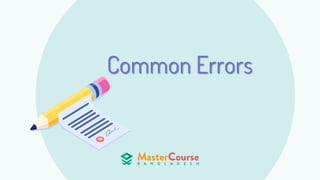
Lecture 34
- 2. • Did এর পরর to ব্যতীত infinitive এর পররব্রতে principal verbএর past tense Don’t say: Did you went to school? Say: Did you go to school? • Does, can, must এর পরর to ছাড়া infinitive এর পররব্রতে principal verb এর সারে s/es Don’t say: Does the gardener waters the flower? Say: Does the gardener water the flower? Don’t say: Can he speaks English? Say: Can he speak English?
- 3. • Tense এর ক্রম এর ভু ল ব্যব্হার করা। Subordinate clause এ Might এর পররব্রতে May এব্ং would এর পররব্রতে will এর ভু ল ব্যব্হার করা। Don’t say: He asked me what I am doing? Say: He asked me what I was doing? Don’t say: Shila told that she may come today. Say: Shila told me that she would come today.
- 4. • Infinitive এর রিহ্ন 'to' এরপর ভু লক্ররম past tense ব্যব্হার করা। Don’t say: He tried to kicked the ball. Say: He tried to kick the ball.
- 5. ● একটি auxiliary verb এর পর আররকটি এর verb এর past participle form এর পররবরতে ভলক্ররে past form বযবহার করা। Don’t say: I have ate rice. Say: I have eaten rice.
- 6. ● Tense এর continuous রুপটির অপবযবহার। Don’t say: I am understanding the lecture now. Say: I understand the lecture now.
- 7. • অভযাসগত কমে প্রকাশ কররত simple present এর পররব্রতে present continuous ব্যব্হার করা। Don’t say: Every morning I am going for a walk. Say: Every morning I go for a walk.
- 8. • অতীরতর অভযাসগত কমে প্রকাশ কররত simple past tense এর পররব্রতে past continuous tense ব্যব্হার করা। Don’t say: Last year I was walking to school every day. Say: Last year I walked to school every day.
- 9. • 'As if' ব্া 'As though' এর পরর past tense এর পররব্রতে present tense ব্যব্হার করা। Don’t say: He talks as if he knows everything. Say: He talks as if he knew everything.
- 10. • Gender রিরে রব্ভ্রারি। Don’t say: The door is open: please shut her. Say: The door is open:please shut it.
- 11. 'to be' verb এর পরর object case ব্যব্হার করা। Don’t say: It was him. Say: It was he.
- 12. 'Himself' ব্া 'themselves' এর পররব্রতে 'hisself' ব্া 'theirselves' ব্যব্হার করা। Don’t say: They fell down and hurt theirselves. Say: They fell down and hurt themselves.
- 13. Indefinite pronoun রহরসরব্ 'his' এর ব্যব্হার। Don’t say: One should take care of his health. Say: One should take care of one's health.
- 14. দুইব্ার negative ব্যব্হার করা। Don’t say: He says he is not afraid of nobody. Say: He says he is not afraid of anybody.
- 15. 'Once' ব্া 'twice' এর পররব্রতে 'one time' ব্া 'two times' ব্যব্হার করা। Don’t say: I was absent one time or two time. Say: I was absent once or twice.
- 16. 'Half past one' এর পররব্রতে 'one and a half' ব্যব্হার করা। Don’t say: Lessons begin at seven and a half. Say: Lesson begin at half past seven.
- 17. 'In the end' এর পররব্রতে 'at the end' ব্যব্হার করা। Don’t say: At the end they reached the city. Say: In the end they reached the city.
- 18. 'The reason is that' এর পররবরতে 'the reason is because' বযবহার করা। Don’t say: The reason is because I believe it. Say: The reason is that I believe it.